HEALING HERBS
We are Nisā®, a “women for women” company
Chili
 In addition to the usual culinary uses, chili extract can also be used for a variety of medical conditions due to its significant antioxidant and anti-inflammatory properties. In addition, chili extracts are rich in the active ingredient capsaicin. Capsaicin is the compound in chili peppers that is responsible for a warming effect on the skin. When capsaicin is absorbed by the skin, it simulates the nociceptors -a subgroup of sensory neurons that transmit sensations of pain. As a result, topical application of capsaicin can reduce pain when applied to an affected area of the body.
In addition to the usual culinary uses, chili extract can also be used for a variety of medical conditions due to its significant antioxidant and anti-inflammatory properties. In addition, chili extracts are rich in the active ingredient capsaicin. Capsaicin is the compound in chili peppers that is responsible for a warming effect on the skin. When capsaicin is absorbed by the skin, it simulates the nociceptors -a subgroup of sensory neurons that transmit sensations of pain. As a result, topical application of capsaicin can reduce pain when applied to an affected area of the body.
Pomegranate
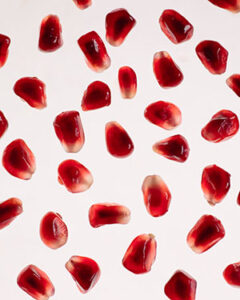 The pomegranate is an ancient fruit that various cultures have consumed for thousands of years for its beneficial therapeutic properties. In recent years, pomegranate has been defined as a functional food, as its consumption has physiological benefits that go beyond normal nutrition. According to extensive scientific research, the valuable compounds in different parts of the fruit have antioxidant, anti-inflammatory, and antiviral properties. Additionally, the consumption of pomegranate has been shown to improve cardiovascular, oral, and skin health.
The pomegranate is an ancient fruit that various cultures have consumed for thousands of years for its beneficial therapeutic properties. In recent years, pomegranate has been defined as a functional food, as its consumption has physiological benefits that go beyond normal nutrition. According to extensive scientific research, the valuable compounds in different parts of the fruit have antioxidant, anti-inflammatory, and antiviral properties. Additionally, the consumption of pomegranate has been shown to improve cardiovascular, oral, and skin health.
St.John Wort
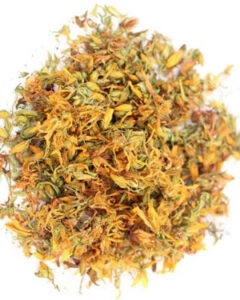 St. John’s wort is a yellow flowering herb that has been used as a traditional medicinal plant since ancient times. Its potential as an herbal antidepressant has made it the most studied medicinal plant in the last two centuries. In addition to internal use, St. John’s wort can also benefit the body when used externally. The herb has significant anti-inflammatory properties that have a soothing effect on the skin. Furthermore, St. John’s wort oil can be applied to the body to provide localised pain relief.
St. John’s wort is a yellow flowering herb that has been used as a traditional medicinal plant since ancient times. Its potential as an herbal antidepressant has made it the most studied medicinal plant in the last two centuries. In addition to internal use, St. John’s wort can also benefit the body when used externally. The herb has significant anti-inflammatory properties that have a soothing effect on the skin. Furthermore, St. John’s wort oil can be applied to the body to provide localised pain relief.
Black Cumin
 Black cumin has a long history in traditional Arabian remedy and was considered by the earliest herbal specialist as “the herb from heaven”. In the past few decades, black cumin has been broadly studied and it has been attributed with a number of biological and pharmaceutical properties. Black cumin has shown significant antioxidant properties, anti-inflammatory and analgesic effects, and antibacterial activity. Due to these properties, Black cumin has shown to be medicinally very effective against various ailments such as dysmenorrhea, and mastalgia.
Black cumin has a long history in traditional Arabian remedy and was considered by the earliest herbal specialist as “the herb from heaven”. In the past few decades, black cumin has been broadly studied and it has been attributed with a number of biological and pharmaceutical properties. Black cumin has shown significant antioxidant properties, anti-inflammatory and analgesic effects, and antibacterial activity. Due to these properties, Black cumin has shown to be medicinally very effective against various ailments such as dysmenorrhea, and mastalgia.
Black Pepper
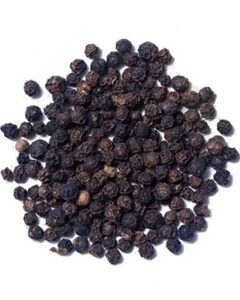 Black pepper (Piper nigrum) is the most commonly used culinary spice worldwide and has been used as a folk medicine in a variety of cultures. Numerous studies have shown the antioxidant effects and the anti-inflammatory properties of black pepper. Additionally, recent studies have shown promising results for the use of black pepper as a way to regulate energy balance.
Black pepper (Piper nigrum) is the most commonly used culinary spice worldwide and has been used as a folk medicine in a variety of cultures. Numerous studies have shown the antioxidant effects and the anti-inflammatory properties of black pepper. Additionally, recent studies have shown promising results for the use of black pepper as a way to regulate energy balance.
Clove
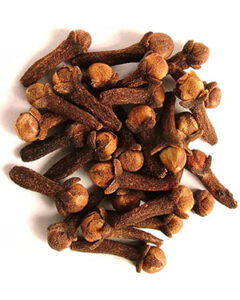 Clove (Syzygium aromaticum) is a common aromatic spice with a wide global usage in alternative medicine. Clove oil has significant anti-inflammatory properties and especially high antioxidant activity. Additionally, Clove is used as a painkiller, due to its analgesic and anaestetic properties.
Clove (Syzygium aromaticum) is a common aromatic spice with a wide global usage in alternative medicine. Clove oil has significant anti-inflammatory properties and especially high antioxidant activity. Additionally, Clove is used as a painkiller, due to its analgesic and anaestetic properties.
Clary Sage
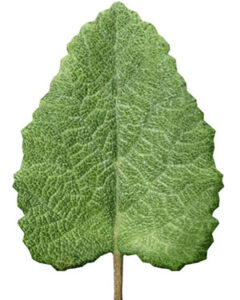 Clary sage oil is often referred to as a woman’s oil. It has antispasmodic properties and can help treat problems such as muscle cramps and headaches by relaxing nerve impulses. The oil can also reduce the stress hormone cortisol. Therefore, clary sage can provide a sense of calm and be beneficial if you suffer from mood lows before your period.
Clary sage oil is often referred to as a woman’s oil. It has antispasmodic properties and can help treat problems such as muscle cramps and headaches by relaxing nerve impulses. The oil can also reduce the stress hormone cortisol. Therefore, clary sage can provide a sense of calm and be beneficial if you suffer from mood lows before your period.
Lavender
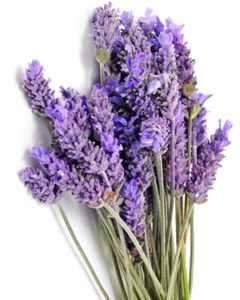 The oil from the lavender plant is a popular essential oil due to its use in medicine and cosmetic products preparation. Lavender oil has strong analgesic, anti-inflammatory and anti-depressive properties. Research found that lavender successfully provided relief from anxiety, insomnia, depression, menstrual pain, and headaches.
The oil from the lavender plant is a popular essential oil due to its use in medicine and cosmetic products preparation. Lavender oil has strong analgesic, anti-inflammatory and anti-depressive properties. Research found that lavender successfully provided relief from anxiety, insomnia, depression, menstrual pain, and headaches.
Cannabis
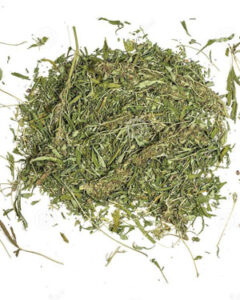 For centuries, women have used cannabis and hemp to treat their menstrual cycles and PMS symptoms. Even Queen Victoria was known to be prescribed a monthly dose of cannabis for her PMS symptoms. The cannabinoids -main active ingredients of cannabis plant- can interact with the body’s endocannabinoid system, which is involved in various processes in the body, such as inflammation management, appetite and metabolism and mood. For example, CBD -one of the most studied cannabinods- has the potential to act as a mood enhancer by interacting with brain’s serotonin receptors.
For centuries, women have used cannabis and hemp to treat their menstrual cycles and PMS symptoms. Even Queen Victoria was known to be prescribed a monthly dose of cannabis for her PMS symptoms. The cannabinoids -main active ingredients of cannabis plant- can interact with the body’s endocannabinoid system, which is involved in various processes in the body, such as inflammation management, appetite and metabolism and mood. For example, CBD -one of the most studied cannabinods- has the potential to act as a mood enhancer by interacting with brain’s serotonin receptors.
Curcumin
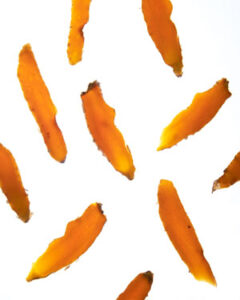 Turmeric has several pharmacological properties and may have a positive effect on relieving menstrual pain. Turmeric has the ability to inhibit the synthesis of prostaglandins. Prostaglandins are tissue fats that stimulate uterine contractions and contribute to pain and inflammation. By inhibiting these prostaglandins, turmeric can positively influence menstrual cramps by causing the uterus to contract less frequently and severely.
Turmeric has several pharmacological properties and may have a positive effect on relieving menstrual pain. Turmeric has the ability to inhibit the synthesis of prostaglandins. Prostaglandins are tissue fats that stimulate uterine contractions and contribute to pain and inflammation. By inhibiting these prostaglandins, turmeric can positively influence menstrual cramps by causing the uterus to contract less frequently and severely.
Ginger
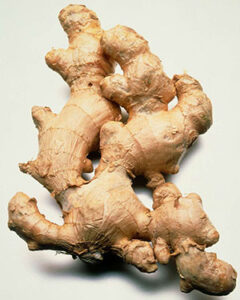
Ginger is commonly used in herbal medicine all around the world. Ginger and its components contain a significant amount of beneficial pharmacological activities, such as gastrointestinal, analgesic, antioxidant, and anti-inflammatory activities. As a result, ginger has been proven to have beneficial effects on symptoms such as vomiting, nausea, migraines, headaches, and so forth. Additionally, studies have shown that ginger can influence the prostaglandins system, which allows ginger to have a beneficial effect on primary dysmenorrhea.
Grapes (dark) / Grapeseed Oil
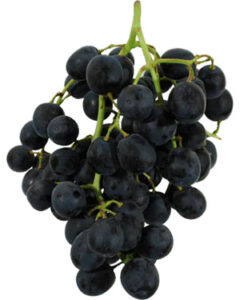 Grape seeds are known to be rich in flavonoid compounds such as resveratrol. As a result of these compounds, supplementation with grape and grape seeds can have beneficial effects on cardiovascular health and inflammation. Due to the beneficial Essential fatty acids—like linoleic acid, vitamin E, and phytosterols, as well as hydrophilic phenols— of grape seed oil, It was given the title of “Functional Food.”
Grape seeds are known to be rich in flavonoid compounds such as resveratrol. As a result of these compounds, supplementation with grape and grape seeds can have beneficial effects on cardiovascular health and inflammation. Due to the beneficial Essential fatty acids—like linoleic acid, vitamin E, and phytosterols, as well as hydrophilic phenols— of grape seed oil, It was given the title of “Functional Food.”
Saffron
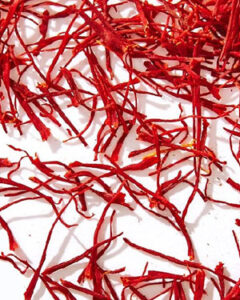 Saffron is thought to be particularly beneficial for PMS symptoms, as it can relieve both physical and psychological symptoms. The muscle-relaxing and antispasmodic properties of saffron can help with cramps before and during periods, while its effect on serotonin and dopamine reuptake can help balance mood.
Saffron is thought to be particularly beneficial for PMS symptoms, as it can relieve both physical and psychological symptoms. The muscle-relaxing and antispasmodic properties of saffron can help with cramps before and during periods, while its effect on serotonin and dopamine reuptake can help balance mood.
Moringa
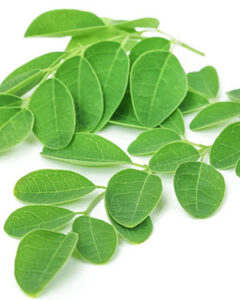 Moringa (Moringa oleifera) is widely known and used for its healing abilities and has earned its name as ‘the miracle tree’ due to its amazing healing abilities for various ailments. Moringa contains many essential vitamins, minerals, amino acids, omega 3 fatty acids, antioxidants, and anti-inflammatory nutrients. As a result, moringa can have beneficial effects on ailments such as long-lasting inflammatory diseases, stomach pain, joint pain, and several bacterial infections.
Moringa (Moringa oleifera) is widely known and used for its healing abilities and has earned its name as ‘the miracle tree’ due to its amazing healing abilities for various ailments. Moringa contains many essential vitamins, minerals, amino acids, omega 3 fatty acids, antioxidants, and anti-inflammatory nutrients. As a result, moringa can have beneficial effects on ailments such as long-lasting inflammatory diseases, stomach pain, joint pain, and several bacterial infections.
Evening Primrose
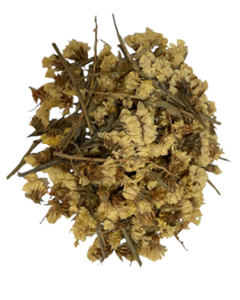 Evening primrose oil has played a special role for women in the treatment of gynaecological conditions throughout their lives. Evening primrose oil provides the body with two vital polyunsaturated fatty acids, including linoleic acid (LA, 60%-80%) and γ-linolenic acid (GLA, 8%-14%). Evening primrose oil helps support hormonal balance. In addition to helping with menstrual-related complaints, evening primrose promotes skin health, supports bone density and improves fertility.
Evening primrose oil has played a special role for women in the treatment of gynaecological conditions throughout their lives. Evening primrose oil provides the body with two vital polyunsaturated fatty acids, including linoleic acid (LA, 60%-80%) and γ-linolenic acid (GLA, 8%-14%). Evening primrose oil helps support hormonal balance. In addition to helping with menstrual-related complaints, evening primrose promotes skin health, supports bone density and improves fertility.
Sea Buckthorn/Seaberry
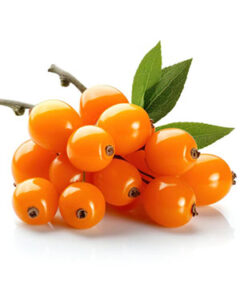 For centuries, Sea buckthorn has been used as a traditional medicine by people in Europe and throughout Asia. Sea buckthorn is valued for its antioxidant, cardioprotective, antibacterial, and anti-inflammatory effects. Additionally, it has been shown to be able to reduce pain and it can help your body respond to stress, anxiety and fatigue.
For centuries, Sea buckthorn has been used as a traditional medicine by people in Europe and throughout Asia. Sea buckthorn is valued for its antioxidant, cardioprotective, antibacterial, and anti-inflammatory effects. Additionally, it has been shown to be able to reduce pain and it can help your body respond to stress, anxiety and fatigue.
![]()
123 Main Street
City Name, Region
Postal Code, Country
- +1-657-543-7653
- +1-657-543-7612
- [email protected]
Designed & Developed by e-outbox.
